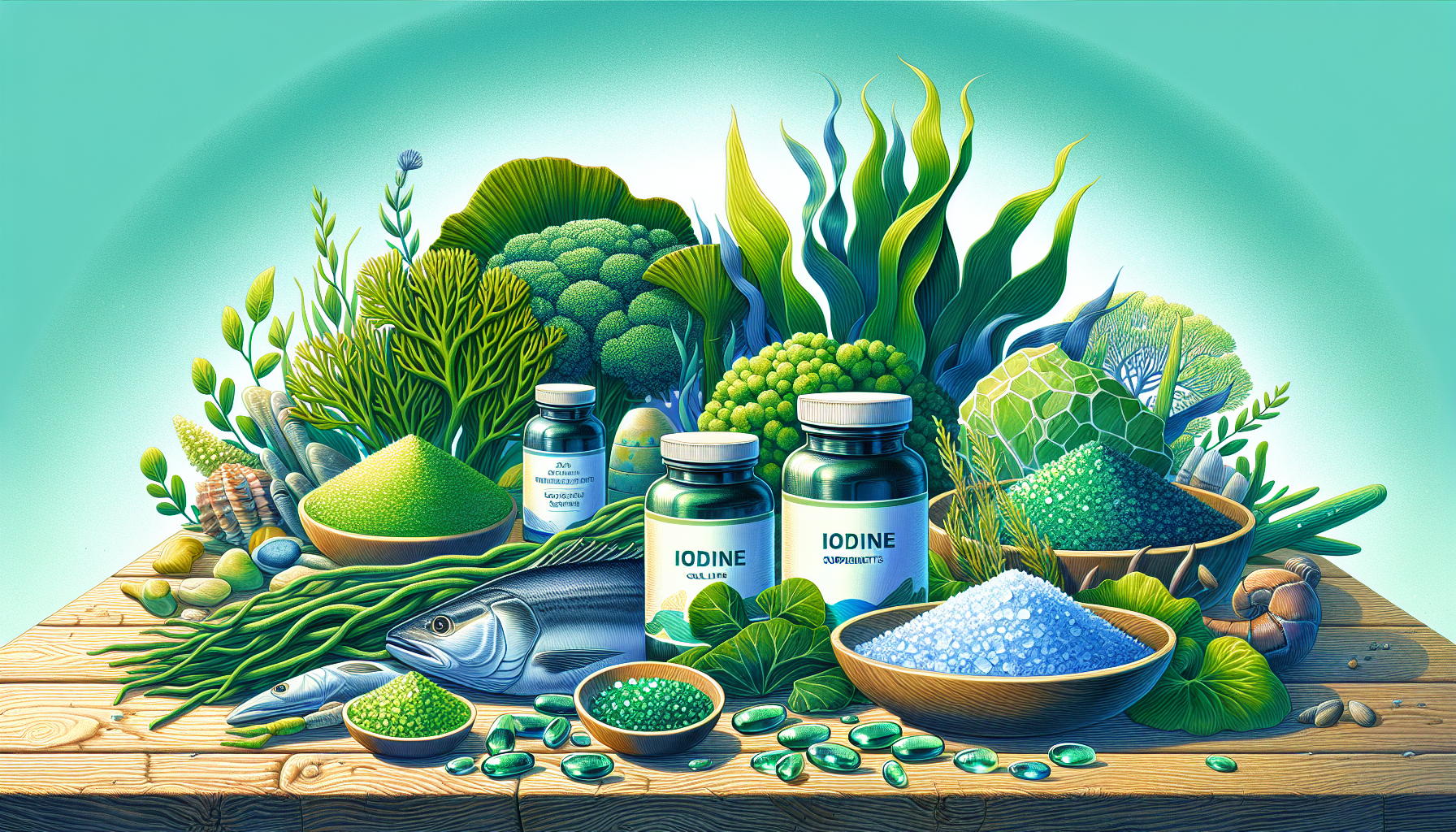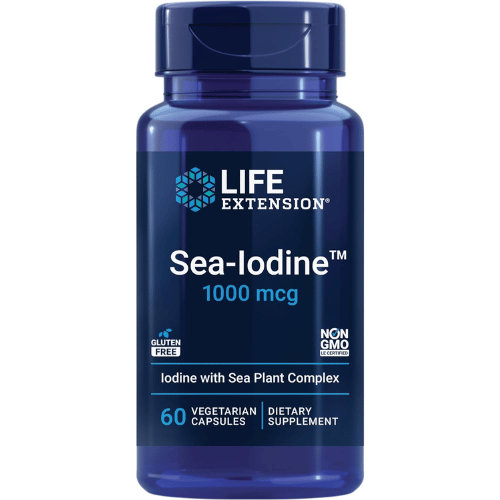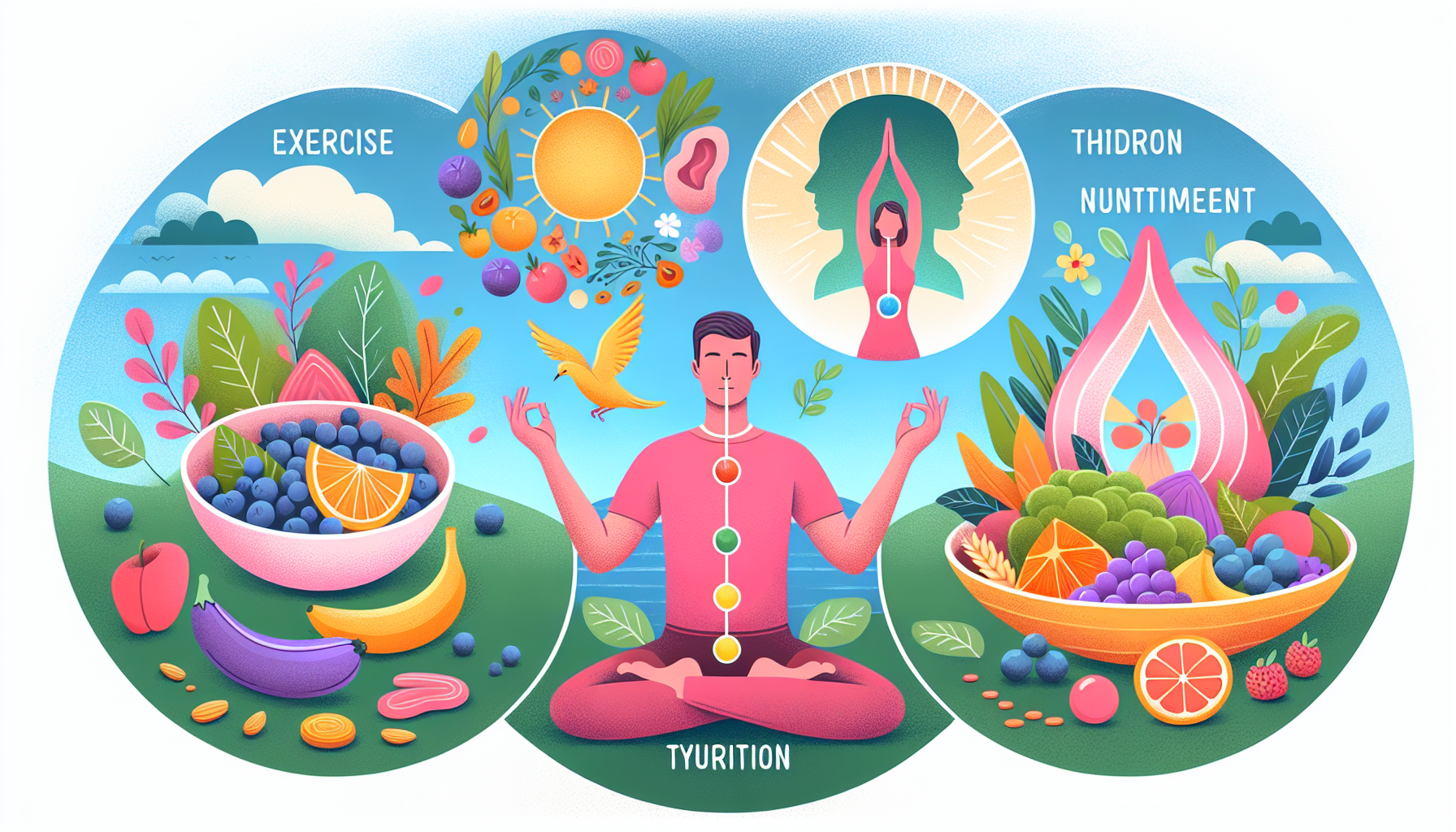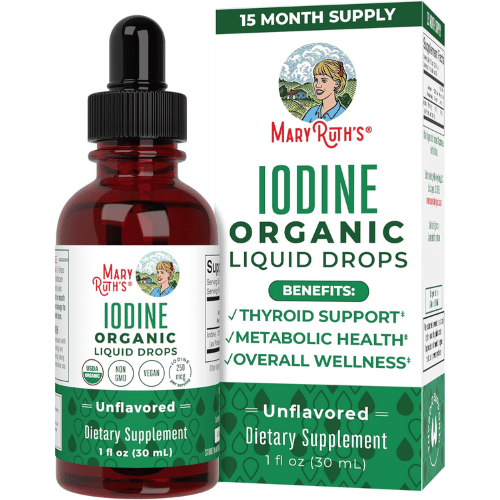Ensuring you get enough iodine is essential for maintaining a healthy thyroid gland, as this vital mineral plays a crucial role in thyroid hormone production. When iodine levels are too low, it can lead to significant health issues, including an enlarged thyroid gland, also known as goiter and other thyroid-related disorders. Iodine deficiency is a global concern, particularly in iodine-deficient areas and among specific populations like pregnant women, those following vegan diets, or individuals with preexisting thyroid conditions. For these groups, iodine supplements can be crucial to their health regimen. However, with so many iodine supplements available, finding the best supplement for iodine can be overwhelming.
In this article, we'll guide you through the importance of iodine, identify when you might need an iodine supplement, and offer our top picks to help you make an informed choice. We’ll also delve into why iodine supplementation is essential, the risk factors associated with insufficient iodine intake, and the potential dangers of excessive iodine intake, particularly for those with thyroid autoimmunity or other thyroid issues. Understanding these aspects will empower you to make the best decision for your health and ensure optimal thyroid function.
Key Takeaways
- Iodine is an essential nutrient crucial for thyroid hormone production, and deficiencies can lead to serious health issues, including goiter and cognitive impairments.
- Iodine supplements are essential for individuals at risk of deficiency, such as pregnant women and those following vegan diets, and should be chosen based on quality and form.
- Excessive iodine intake can cause significant health problems, particularly in individuals with preexisting thyroid conditions, and monitoring intake is essential to avoid adverse effects.
Understanding Iodine and Its Importance

Iodine is a trace mineral and an essential nutrient the body requires to function correctly. The primary role of iodine is in the thyroid gland, which produces thyroid hormones such as thyroxine (T4) and triiodothyronine (T3). These hormones regulate various bodily functions, including metabolism, growth, and development. Without sufficient iodine, the thyroid cannot produce enough hormones, leading to a condition known as hypothyroidism.
One of the first noticeable signs of iodine deficiency is goiter, an enlargement of the thyroid gland. Goiter occurs as the thyroid gland tries to compensate for the lack of iodine by growing to capture more of the mineral from the bloodstream. More severe iodine deficiency can lead to cognitive impairments in children and decreased mental function in adults. Iodine deficiency is one of the leading causes of preventable intellectual disabilities worldwide.
Iodine is typically introduced into the human diet by adding it to certain foods and salt. However, many foods do not contain iodine, so deficiencies are relatively common. The recommended daily allowance of iodine for adults is 150 micrograms, but this requirement increases for pregnant and breastfeeding women. Pregnant women, in particular, need 220 micrograms of iodine daily to support fetal development.
The risk of iodine deficiency is higher in regions where the soil is low in iodine. This is why iodized salt has become a widespread public health measure to ensure adequate iodine intake. Despite these measures, certain populations, such as those on vegan diets or living in iodine-deficient areas, may still struggle to meet their iodine requirements.
Maintaining adequate iodine levels is vital for thyroid hormone health and overall well-being.
When You Might Need an Iodine Supplement
Iodine supplements are essential for those at risk of deficiency, such as individuals with specific dietary needs or living conditions. Pregnant women need higher iodine intake to support fetal bone and brain development.
People following vegan diets or those with limited intake of dairy and seafood are also at a higher risk of iodine deficiency. This is because plant-based diets often lack sufficient iodine, and without the inclusion of iodized salt, meeting the daily iodine requirements can be challenging.
Additionally, those living in regions where iodine is not found or is low in the soil may struggle to consume enough iodine through their diet alone. Even individuals consuming foods high in goitrogens—a substance that interferes with iodine use—might need more iodine to counteract its effects.
Iodine supplements can fill the gap when dietary supplements intake is insufficient iodine intake.
Top Recommended Iodine Supplements
When it comes to iodine supplements, there are several top-notch options available that can help address iodine deficiency and support thyroid health. One highly recommended supplement is Mary Ruth's Organics Liquid Iodine, known for its high quality and easy absorption. This vegan formula delivers 250 mcg of iodine (as Potassium Iodide) per serving, making it especially suitable for individuals with specific dietary needs, such as those on vegan or vegetarian diets or those pregnant and nursing. The liquid form is easy to take and allows for flexible dosing, which is important since iodine needs vary based on diet and health status. Additionally, this supplement is free of common allergens and produced in a GMP facility, ensuring a reliable and safe option for anyone looking to support their iodine intake.
Another excellent option, in capsule form, is Life Extension Sea-Iodine, a natural source of iodine extracted from kelp and bladderwrack seaweed. Each capsule provides 225 mcg of iodine, meeting 100% of the daily value at a reasonable price. This supplement is particularly beneficial for those looking to support thyroid health, as iodine is crucial for producing the essential thyroid hormones T3 and T4, which help regulate metabolism and energy levels. Unlike many iodine sources that rely on table salt, Life Extension’s Sea-Iodine offers a convenient way to maintain healthy iodine levels without added salt, making it an excellent choice for health-conscious individuals. Life Extension is committed to using high-quality, non-GMO ingredients, and their products are manufactured in the USA, ensuring you receive a pure and reliable supplement to support your overall well-being.

Kelp and Bladderwrack-Derived Iodine, Supports Healthy Levels of Iodine for Thyroid Health
Potassium Iodide is often highlighted as the best choice for those seeking a supplement specifically for thyroid support. It is considered the safest for those not getting enough iodine.
Liquid iodine supplements, such as MaryRuth Organics, are often more easily absorbed than capsules.
How to Choose the Right Iodine Supplement
Choosing the right iodine supplement requires considering its form and quality. Supplements come in capsules and liquid tinctures; liquids may absorb better, while capsules can be more convenient.
Select supplements from reputable brands that are transparent about sourcing and testing to ensure quality and correct iodine content.
Consider your deficiency level and consult a healthcare provider to determine the appropriate dosage before purchasing an iodine supplement.
Check for allergens or unnecessary additives in the supplement to avoid side effects.
Potential Side Effects and Risks of Excessive Iodine Intake
While iodine is essential for thyroid health, excessive iodine intake can lead to serious health issues, including thyroid disorders like thyroiditis and an increased risk of thyroid cancer. Individuals with preexisting thyroid conditions may experience either hypothyroidism or hyperthyroidism when consuming high levels of iodine.
Symptoms of iodine overconsumption can include gastrointestinal issues such as nausea, vomiting, and diarrhea. In severe cases, excessive iodine intake may cause confusion and lethargy.
Children and pregnant women are particularly vulnerable to the adverse effects of excessive iodine intake. It’s vital to monitor iodine intake and ensure it stays within the recommended limits—the maximum allowable iodine intake for adults is under 1100 mcg daily.
Consider dietary iodine sources when increasing dietary iodine intake to avoid excessive intake.
Natural Sources of Iodine

To naturally increase iodine intake, incorporate foods like seafood, dairy products, and iodized salt, which are rich in this nutrient.
Seafoods like cod, tuna, and shrimp are particularly rich in iodine. Dairy items like milk, yogurt, and cheese also provide substantial iodine.
Iodized salt is a common and easy source of iodine. Some breads, particularly those made with iodate dough conditioners, also contribute to iodine intake.
Supporting Thyroid Health Beyond Iodine

Besides iodine, other nutrients and lifestyle choices support thyroid function. Selenium, for instance, is crucial for converting T4 to T3, the active thyroid hormone, and can help improve thyroid symptoms and reduce TSH levels. For those looking to learn more about the importance of selenium, our article, “The Health Enthusiast's Dream: Five Of The Best Zinc Selenium Supplements You Need to Know,” offers an in-depth look at this essential trace mineral. The article reviews five top supplement brands, providing valuable insights for those seeking to enhance their thyroid health through dietary supplements. Incorporating these trace minerals, along with iodine supplements, into your routine can provide comprehensive thyroid support, particularly for individuals managing conditions like Hashimoto’s and hypothyroidism.
A paleo-style diet, rich in whole, unprocessed foods and anti-inflammatory diets, can benefit those with thyroid issues by reducing inflammation.
Dietary changes, in addition to iodine supplements, can significantly benefit conditions like Hashimoto’s and hypothyroidism.
The Role of Iodine in Autoimmune Thyroid Disease
People with autoimmune thyroid disease, including Hashimoto’s, may have heightened sensitivity to iodine. Excessive iodine intake can exacerbate harmful effects in these individuals, perpetuating inflammation and thyroid dysfunction. Balancing iodine intake is vital for those with autoimmune thyroid disease, as too much iodine can trigger or worsen hypothyroidism.
Wrapping Up Our Discussion on Iodine
In summary, iodine is an essential nutrient that plays a critical role in maintaining thyroid health, supporting the production of thyroid hormones, and ensuring overall well-being. Recognizing the signs of iodine deficiency and knowing when to consider iodine supplements is crucial for individuals at risk, such as those with an underactive thyroid, autoimmune thyroid disease, or those following a diet low in iodine-rich foods. Choosing the best supplement for iodine, whether in liquid, capsule, or other forms, is essential for addressing your needs. It’s also vital to monitor iodine intake carefully, as excessive iodine intake can lead to thyroid dysfunction and other health issues.
However, managing thyroid health goes beyond just taking iodine supplements. A holistic approach, including dietary adjustments, lifestyle changes, and other essential nutrients like selenium and zinc, is vital for optimal thyroid function. Resources such as our article above offer additional insights into how trace minerals can further support your thyroid health. By understanding the full scope of thyroid support, including iodine supplementation and other dietary supplements, you can take proactive steps to ensure your thyroid gland functions optimally, leading to better health outcomes.
Brief Answers to FAQs
What are the best iodine supplements available?
Currently, the best iodine supplements are MaryRuth Organics Liquid Iodine, Life Extension's Sea-Iodine, and Pure Encapsulations Iodine. These options are highly regarded for their quality and effectiveness.
Who is at risk of iodine deficiency?
Individuals at risk of iodine deficiency include pregnant women, those following vegan diets, and people residing in iodine-deficient regions. These groups need to ensure adequate iodine intake for their health.
What are the symptoms of excessive iodine intake?
Excessive iodine intake can lead to gastrointestinal disturbances like nausea, vomiting, and diarrhea, as well as symptoms such as confusion and lethargy. It is essential to monitor iodine consumption to avoid these adverse effects.
What are some natural sources of iodine?
Natural sources of iodine encompass seafood, dairy products, iodized salt, and certain types of bread. Incorporating these foods into your diet can help maintain adequate iodine levels.
How can I support my thyroid health beyond iodine supplementation?
To support your thyroid health beyond iodine supplementation, consider ensuring an adequate intake of selenium and probiotics and adopting an anti-inflammatory or paleo-style diet. These measures can contribute to overall thyroid function and health.
Thank you for joining us in this discussion of the best supplements for iodine. If you want to add to your library of knowledge and are interested in diving deeper into some of the supplements mentioned in this article, you should check out the links above. It could be a huge time-saver - you won't be sorry you took a look.
And remember to check back with us often for information on many other natural supplements and vitamins!
*We are not qualified medical advisors. The content here is only based on our personal opinions, and research and should NOT be used as a substitute for a healthcare professional's advice!
**This site contains affiliate links. We may earn a small commission through links in this post.












Member discussion